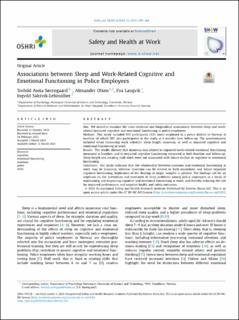Associations between Sleep and Work-Related Cognitive and Emotional Functioning in Police Employees
Peer reviewed, Journal article
Published version

Åpne
Permanent lenke
https://hdl.handle.net/11250/2775093Utgivelsesdato
2021Metadata
Vis full innførselSamlinger
- Institutt for psykologi [3103]
- Publikasjoner fra CRIStin - NTNU [38127]
Originalversjon
https://doi.org/10.1016/j.shaw.2021.03.002Sammendrag
Aim
We aimed to examine the cross-sectional and longitudinal associations between sleep and work-related impaired cognitive and emotional functioning in police employees.
Methods
This study included 410 participants (52% men) employed in a police district in Norway at baseline, of which 50% also participated in the study at 6 months later follow-up. The questionnaires included items measuring work schedule, sleep length, insomnia, as well as impaired cognitive and emotional functioning at work.
Results
The results showed that insomnia was related to impaired work-related emotional functioning measured at baseline, and to impaired cognitive functioning measured at both baseline and follow-up. Sleep length and rotating shift work were not associated with future decline in cognitive or emotional functioning.
Conclusion
Our study indicates that the relationship between insomnia and emotional functioning at work may be transient, whereas insomnia can be related to both immediate and future impaired cognitive functioning. Replication of the findings in larger samples is advised. The findings call for an emphasis on the prevention and treatment of sleep problems among police employees as a mean of maintaining and improving cognitive and emotional functioning at work, and thereby reducing the risk for impaired performance and negative health and safety outcomes.
